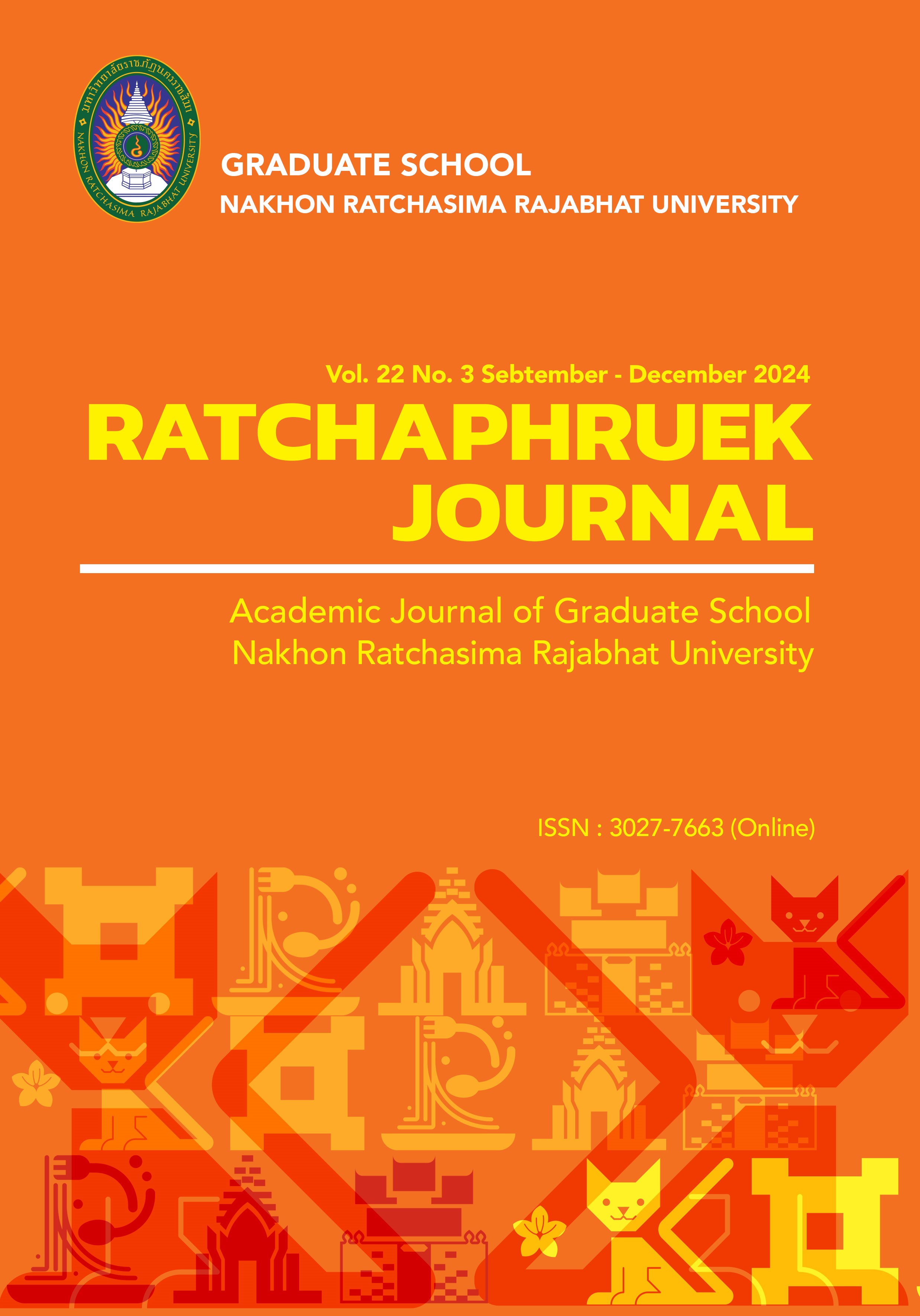การพัฒนารูปแบบการบริหารจัดการสถานศึกษาด้วยมโนทัศน์หลักสู่ความยั่งยืน สำหรับสถานศึกษาสังกัดสำนักงานคณะกรรมการการอาชีวศึกษา
Main Article Content
บทคัดย่อ
การวิจัยนี้มีวัตถุประสงค์ คือ 1) พัฒนารูปแบบการบริหารจัดการสถานศึกษาด้วยมโนทัศน์หลักสู่ความยั่งยืน สำหรับสถานศึกษาสังกัดสำนักงานคณะกรรมการการอาชีวศึกษา 2) เพื่อตรวจสอบความเหมาะสมและความเป็นไปได้ของรูปแบบการบริหารจัดการสถานศึกษาด้วยมโนทัศน์หลักสู่ความยั่งยืน 3) ประเมินรูปแบบด้านความถูกต้อง อรรถประโยชน์และความรับผิดชอบในการประเมิน ผู้ให้ข้อมูลหลักสำคัญ ได้แก่ ผู้ทรงคุณวุฒิ ยืนยันมโนทัศน์ จำนวน 9 คน และ ผู้เชี่ยวชาญประเมินรูปแบบ จำนวน 11 คน ได้มาโดยการเลือกแบบเจาะจง เครื่องมือที่ใช้ในการวิจัย ได้แก่ แบบวิเคราะห์เนื้อหา แบบบันทึกการสนทนากลุ่ม แบบประเมินความเหมาะสมและความเป็นไปได้ แบบประเมินความถูกต้อง อรรถประโยชน์และความรับผิดชอบในการประเมิน วิเคราะห์ข้อมูลด้วยการวิเคราะห์เนื้อหา และใช้สถิติพื้นฐาน ได้แก่ ค่าเฉลี่ยและส่วนเบี่ยงเบนมาตรฐาน
ผลการวิจัยพบว่า 1) รูปแบบการบริหารจัดการสถานศึกษาด้วยมโนทัศน์หลักสู่ความยั่งยืน ประกอบด้วยมโนทัศน์หลัก 3 ด้าน คือ ด้านการบริหารทรัพยากรมนุษย์ ด้านการออกแบบองค์กร และกระบวนการทำงาน และด้านการมุ่งผู้เรียนและผู้มีส่วนได้ส่วนเสีย 2) ผลการสร้างรูปแบบการบริหารจัดการสถานศึกษา ผู้ทรงคุณวุฒิมีความเห็นสอดคล้องกันว่ามีความเหมาะสมและมีความเป็นไปได้ในการนำรูปแบบไปใช้ และ 3) ผลการประเมินรูปแบบการบริหารจัดการสถานศึกษา โดยผู้เชี่ยวชาญผู้บริหารสถานศึกษา มีความเห็นสอดคล้องกันว่ามีความถูกต้อง มีอรรถประโยชน์และมีความรับผิดชอบ อยู่ในระดับมาก
Article Details

อนุญาตภายใต้เงื่อนไข Creative Commons Attribution-NonCommercial-NoDerivatives 4.0 International License.
เอกสารอ้างอิง
กระทรวงศึกษาธิการ. (2564). ประกาศกระทรวงศึกษาธิการ เรื่อง นโยบายและจุดเน้นของกระทรวง ศึกษาธิการ ปีงบประมาณ พ.ศ. 2565. สืบค้นเมื่อ 2 พฤษภาคม 2567, จาก https://moe 360. blog/2022/01/19/policy-and-focus-moe/
ชัยวิชิต เชียรชนะ. (2565). วิธีวิทยาการวิจัยขั้นสูง: การมุ่งเน้นการคิดเชิงวิพากษ์สำหรับการวิจัย. กรุงเทพฯ: ศูนย์ผลิตตำราเรียน มหาวิทยาลัยเทคโนโลยีพระจอมเกล้าพระนครเหนือ.
ณัฐสิฏ รักษ์เกียรติวงศ์. (2559). การปฏิรูปอาชีวศึกษาของประเทศไทย. สืบค้นเมื่อ 8 มิถุนายน 2565, จาก https://tdri.or.th/2016/08/vocational-education-reform/
ดำรง บุญกลาง. (2560). การพัฒนารูปแบบการบริหารคุณภาพการศึกษาของสถานศึกษาสังกัดองค์กรปกครองส่วนท้องถิ่นในเขตภาคเหนือ (วิทยานิพนธ์ดุษฎีบัณฑิต, มหาวิทยาลัยวงษ์ชวลิตกุล).
ทวน เที่ยงเจริญ. (2563). การพัฒนาระบบการบริหารสถานศึกษาเพื่อความเป็นเลิศของสถานศึกษา สังกัดสำนักงานเขตพื้นที่การศึกษามัธยมศึกษา (วิทยานิพนธ์ดุษฎีบัณฑิต, มหาวิทยาลัย ราชภัฏวไลยอลงกรณ์ ในพระบรมราชูปถัมภ์).
ทิพวรรณ หล่อสุวรรณรัตน์. (2551). องค์กรสมรรถนะสูงกับความรับผิดชอบต่อสังคม. วารสารจัดการภาครัฐและเอกชน, 15(2), น. 11-35.
นิสดารก์ เวชยานนท์. (2554). การบริหารทุนมนุษย์เชิงกลยุทธ์เพื่อเพิ่มมูลค่า. กรุงเทพฯ: สถาบันบัณฑิตพัฒนบริหารศาสตร์.
ประกาศสำนักนายกรัฐมนตรี เรื่อง การประกาศแผนแม่บทเฉพาะกิจภายใต้ยุทธศาสตร์ชาติอันเป็นผลมาจากสถานการณ์โควิด-19 พ.ศ. 2564-2565. (30 ตุลาคม 2563). ราชกิจจานุเบกษา. เล่ม 137 ตอนพิเศษ 305 ง หน้า 3.
พนารัตน์ มาศฉมาดล. (2560). การพัฒนาการศึกษา/การพัฒนาคนตามรัฐธรรมนูญแห่งราชอาณาจักรไทย พุทธศักราช 2560, สืบค้นเมื่อ 21 พฤษภาคม 2567, จาก http:// wiki.kpi.ac.th/index.php?title
พินดา วราสุนันท์. (2554). บทความวิจารณ์หนังสือเรื่อง The Program Evaluation Standards (3rd ed.) ปี ค.ศ. 2010. วารสารวิธีวิทยาการวิจัย, 24(2), น. 273-278.
ภาณัททกา วงษากิตติกุล, รัฐพล ประดับเวทย์, ชมพูนุท สุขหวาน และไพรัช วงศ์ยุทธไกร. (2560). การพัฒนารูปแบบการบริหารจัดการอาชีวศึกษาแบบความร่วมมือเพื่อยกระดับคุณภาพสู่มาตรฐานสากล. วารสารวิชาการอุตสาหกรรมศึกษา, 11(2), น. 126-145.
เลิศพร อุดมพงษ์. (2562). การศึกษาเพื่อสร้างความเป็นพลเมืองในการส่งเสริมบทบาทของภาคพลเมืองในการเมืองระบบตัวแทน: แนวทางที่ยั่งยืนผ่านประสบการณ์จากต่างประเทศ. สืบค้นเมื่อ 16 ธันวาคม, 2566, จาก https://www.kpi.ac.th/media_kpiacth/pdf/ M8_272.pdf
วินุลาศ เจริญชัย. (2562). รูปแบบการบริหารจัดการองค์การสมรรถนะสูงเพื่อพัฒนาคุณภาพในสถานศึกษาสังกัดองค์การบริหารส่วนจังหวัด. สืบค้นเมื่อ 24 กุมภาพันธ์ 2567, จาก https://so06.tci-thaijo.org/index.php/umt-poly/article /view/242853
สาโรจน์ ขอจ่วนเตี๋ยว. (2561). การพัฒนารูปแบบการบริหารจัดการอาชีวศึกษาประเภทช่างอุตสาหกรรมภายใต้นโยบายประเทศไทย 4.0. วารสารพัฒนาเทคนิคศึกษา, 30(105), น. 53-62.
สำนักงานเลขาธิการสภาการศึกษา. (2560). แผนการศึกษาแห่งชาติ (พ.ศ. 2560-2579). กรุงเทพฯ: พริกหวานกราฟฟิค.
สำนักงานสภานโยบายการอุดมศึกษาวิทยาศาสตร์วิจัยและนวัตกรรม. (2564). บทวิเคราะห์อันดับขีดความสามารถในการแข่งขันของไทย ประจำปี 2564 ในด้านที่เกี่ยวข้องกับการอุดมศึกษาวิทยาศาสตร์ วิจัยและนวัตกรรม จากรายงาน IMD World Competitiveness Yearbook 2021. สืบค้นเมื่อ 16 ธันวาคม 2566,จาก https://stiic.sti.or.th/wp-content/ uploads/2022/03/IMD-2021-Final.pdf
สำนักงานสภาพัฒนาการเศรษฐกิจและสังคมแห่งชาติ. (2566). ข่าวสภาพัฒน์. สืบค้นเมื่อ 16 ธันวาคม 2566, จาก https://www.nesdc.go.th/ewt_dl_link.php?nid=14786
อนุสรณ์ แสงนิ่มนวล. (2565). คลี่ปัญหาอาชีวศึกษาไทย. เดลินิวส์การศึกษา. สืบค้นเมื่อ 18 ตุลาคม 2566, จาก https://d.dailynews.co.th/education/632314/
Chianchana, C. (2022). Development of an Educational Sustainability Assessment Model: Application of the Delphi Technique and Pilot Study. Journal of Education and e-Learning Research, 9(2), pp. 119-128.
Linder, J. C. & Brooks, J. D. (2004). Transforming the public sector. Outlook, 6(3), pp. 74-83.
Miller, L. M. (2012). The High-Performance Organization An Assessment of Virtues and Values. Retrieved January 24, 2017, from http://www.bahai-library.com/1743
Spears, L. (1995). Reflections on leadership: How Robert K. Greenleaf’s theory of servant Leadership in fluence today’s top management thinker. New York: John Wiley & Sons.
Stoner, A. F. & Wankel, C. (1986). Management, (3rd ed.). New Delhi: Prentice-Hill.
Yang, H. (2018). A Study on the Management Mode of Modern Vocational Education in China (Doctoral dissertation, National Institute of Development Administration). Retrieved February 19, 2024, from https://libdcms.nida.ac.th/thesis6/2018/b204 891.pdf
Waal, A. D. (2008). The Secret of High Performance Organization. Retrieved January 29, 2024, from http://www.andredewaal.eu/pdf2008/MORE2008


